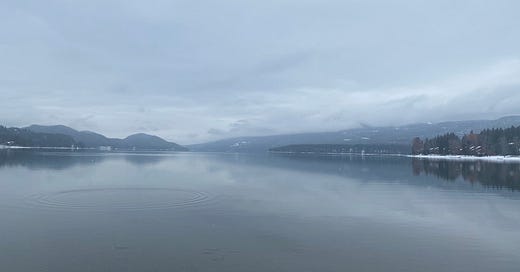“Public property rights stand equally important [to private ownership], for they secure the life sources for all citizens: the air, water, oceans, wildlife, fish, forests, vegetation, and soils. Without an abundance of such natural wealth, there can be no social stability, and thus no individual liberty, for citizens struggling to survive can fall prey to tyrants.” —Mary Christina Wood, Nature’s Trust: Environmental Law for a New Ecological Age
I recently finished reading John Vaillant’s book The Golden Spruce, about a famous golden spruce tree and the logger-turned-environmental activist who cut it down. Somewhere around a third of the way through I almost stopped reading, because I wasn’t sure if I could handle yet another story of the utter destruction wrought by commodification and unchecked capitalism.*
It’s an incredible history, reaching back to the first meetings of the Haida people with European ships looking for commodities and trade in the late 1700s, delving into the growth and mechanization of the logging industry, and tracking one man’s personal journey of heroism or hell.
I kept reading because Vaillant is an excellent writer and several friends whose judgment I trust have recommended him, and I wasn’t sorry I kept going. I didn’t feel any better about commodification or humanity, but Vaillant was deft and matter-of-fact in his treatment of the subjects—not leaving me with hope exactly, but more a bolstering, of refusing to look away from the reality whether you think you can change it or not. His skill in narrative turned the subject from one I wanted to avoid for once, to a book I’ll actually keep on my shelves rather than passing on.
—-
Some days after finishing the book, I walked to City Beach on a gray, cold day with my husband while our kids were at their grandparents’. We ran into one of the swimming teachers from the gym, a woman I’ve known marginally for several years, and was glad to find was coping with quarantines and pandemic as well as possible. We chatted a bit about this and that, and somehow stumbled onto Elon Musk and Mars.
“What are we doing messing about with this planet?” she said. “We need to be out there, we need to be building space stations and moon bases.”
Well, maybe. Do we? I don’t think so. Personally, I think it’s the frontier mentality, looking around and realizing what a mess things are and how much work it’s going to be to clean it all up, and fantasizing about being able to start over with a clean slate elsewhere. It never actually works that way, and space will be no different.
But she talked about the technology and how fascinating it is and how much we benefit from the kind of research that goes into space tech, and that, of course, isn’t wrong. But I still think we’re fooling ourselves if we imagine we can go and do incredible things in space and somehow be a better species when we still can’t bring ourselves to feed all the children on the planet. We’ll do it anyway, though. Or some people will, while others will keep trying to feed all the children.
—-
Recently I’ve been questioning the purposes of art, which is kind of a hopeless quest that every creative person goes through (and just for the record, I think everyone’s a creative person)—a three a.m. “What am I doing here?” wail followed by searches on the internet for wildland firefighter training. Which is doubly silly because I already have a non-writing job and, at 44, am probably too old to go off firefighting.
In any case, Vaillant reminded me that the purpose of art is to serve a perhaps undefinable role in tracing the vast networks of connections, knowledge, pain, hope, and lifeways that bind us together, and will always bind us together, no matter how much we forget about them nor how far we travel from one another. To remind us to keep watching the stars while we feed the children.
*I was going to write “unchecked greed” here, but I don’t think greed is the right word. Greed seems to imply an intent to take from others, knowing that it’s unfair, but the kind of capitalism we function in tells us that there’s nothing wrong with commodification that causes complete destruction, that whatever we pursue in the interests of profit is the right thing to do. Plenty of people participate in this system with willful greed, but plenty of others do because there are no other choices.





Great column, you hit a number of areas! I too struggle these days to read about our continuous destruction (overfishing, Amazon fires, climate change, etc). It all seems so depressing to me, unless I start putting it all into the context of geological or cosmological time. Then I feel better :-)
I completely agree about Mars, seems like a total waste of human capital and money.
An wonderful photographer and exceptional writer I follow is Guy Tal. He talks about art a lot, and I think you will enjoy this and his 'definition' of art:
https://guytal.blog/2017/07/16/drawing-the-line/
Elon Musk is awful. Let's hope he never runs for president.